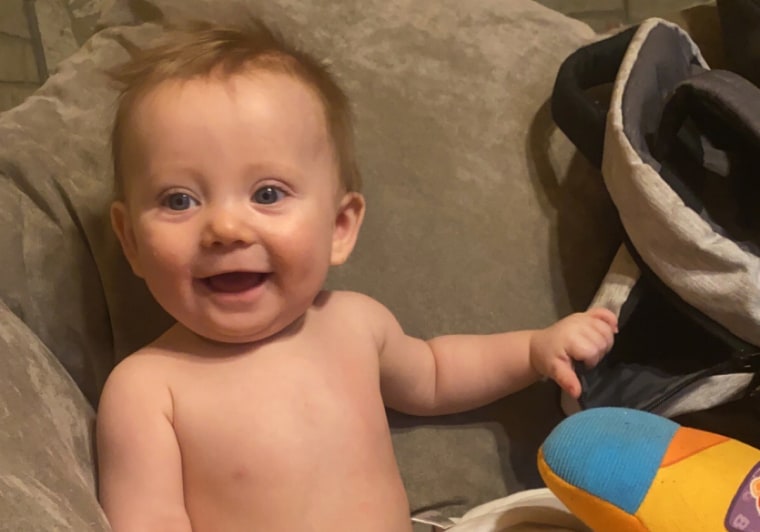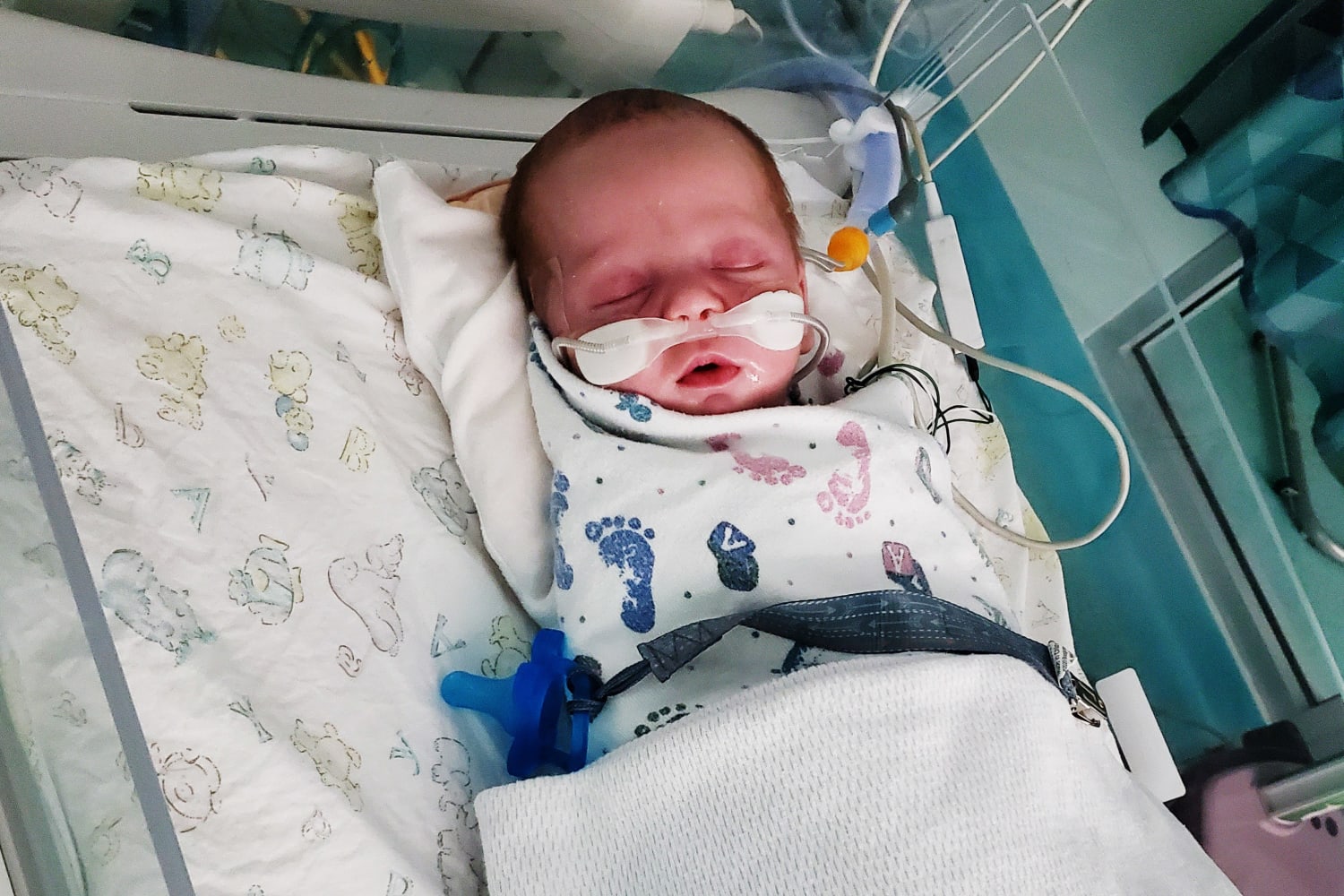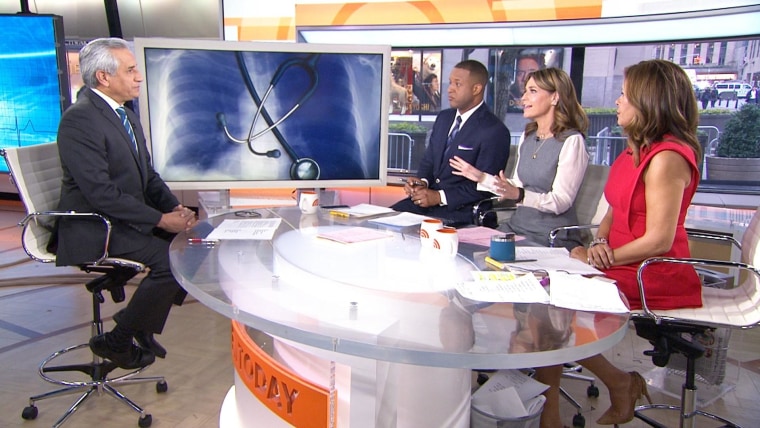Dorina Bryant’s baby, Jaxtyn, was almost 2 weeks old when he caught a virus that left him hospitalized last summer.
His blood oxygen levels were dangerously low and his tiny chest heaved as he breathed. He tested positive for respiratory syncytial virus, or RSV. Despite his oxygen levels falling to 84 percent — 95 percent or higher is considered normal — he was sent home.
Bryant, who lives in Broken Bow, Oklahoma, drove him more than two hours to another hospital. The baby was put on high flow oxygen while his family waited two days for him to be airlifted to a pediatric intensive care unit in a children’s hospital.
It took Jaxtyn’s lungs two months to recover.
“Every time he coughed, you could tell he needed more time to heal,” Bryant said.

A few months later, in November 2021, Hollie Poore found herself in a similar situation. Across the country in South Jordan, Utah, a cold had run through her family of six. The symptoms lingered in her 3-month-old daughter, Susie. The infant tested positive for RSV and, like Jaxtyn, was sent home. Poore took her to the emergency room hours after she was sent home and noticed her daughter’s lips turning blue in the waiting room.
“Immediately, there were tons of doctors in the room putting an oxygen mask on her and admitting her to the ICU,” said Poore.
Almost all children are infected with RSV by the time they turn 2. For most babies, symptoms resemble a bad cold, but the respiratory virus can be dangerous for very young infants who may be vulnerable to complications such as pneumonia.
Jaxtyn and Susie are among the nearly 60,000 children hospitalized with RSV every year, according to Centers for Disease Control and Prevention data. They both survived, but the virus kills as many as 200 children under age 5 each year. In comparison, just over 300 children age 4 and under have died from Covid-19.
“Lower respiratory tract infections kill more children under 5 than anything else and RSV is the No. 1 cause of those infections,” said Dr. Anne Moscona, a virologist and infectious disease physician at Columbia University.
Researchers have tried to discover a safe and effective RSV immunization for decades. New research published Wednesday in the New England Journal of Medicine shows that a one-time injection can protect against RSV complications. The drug, called nirsevimab, was nearly 75 percent effective at preventing RSV-related lower respiratory tract infection, the most common reason for RSV hospitalization in infants, AstraZeneca researchers found.
After earlier trials demonstrated the drug’s safety, the late-stage trial tested how well the drug works. The study included almost 1,500 infants from around the world who were randomly assigned to a placebo or nirsevimab — 994 received the novel drug and 496 received a placebo. All babies were either full-term or late-preterm infants who were at least 35 weeks. Fewer adverse events were reported in the nirsevimab group than the placebo group.
The drug, developed by AstraZeneca, is not a vaccine since it does not require the host to make antibodies against a virus, a process called active immunization. Instead, nirsevimab inoculates babies with antibodies, a process called passive immunization. With nirsevimab, the antibodies stay in the bloodstream and provide protection against severe infection and complications for months, instead of waning quickly.
For infants not considered high risk, the immunization would be given just once, at the beginning of their first RSV season. High-risk babies could get another dose before their second RSV season.
“This protects young infants in that most vulnerable period before their immune system has matured,” said Tonya Villafana, AstraZeneca’s global franchise head, infection and a senior author on the research. “When they get exposed later in life, they can cope with the disease much better.”
The company expects to submit the trial data to the Food and Drug Administration within a few months.
There is a monoclonal antibody that can prevent RSV called palivizumab, but it requires a series of five monthly shots and is only approved for use in high-risk infants and toddlers.
An inoculation like nirsevimab, which would be available to all infants, is badly needed, said Moscona, who was not involved in the research.
She called the safety and efficacy studies “rigorous.” Because the antibodies in nirsevimab have been altered to stay in the body longer — and provide longer-lasting protection — the inoculation is a a “significant improvement” over other antibody therapies, she said.
“We tend to think about these respiratory viruses in kids as only affecting those with underlying illnesses, but globally that’s not the case,” Moscona said. “If we look at the global numbers, most kids who get sick and die with RSV have absolutely no underlying issues.”
How Covid’s spread may have changed RSV
RSV typically circulates with other viruses during the fall through winter. That changed with the delta surge of the pandemic when RSV began spreading last summer, prompting the CDC to issue a warning to parents and doctors. Some experts believe RSV cases could spike again as Covid restrictions are lifted.
“The challenge is that we really don’t know what an RSV season is right now,” said Dr. Michele Kong, a professor at the University of Alabama at Birmingham School of Medicine.
RSV may also impact children born during the pandemic differently than pre-pandemic babies, meaning the need for prevention may be even higher.
“Infants today are largely not exposed to RSV in the way their older siblings were a few years ago,” Kong said. “It’s unknown if they may get sicker because they haven’t had this exposure that builds an immune response.”
Source: | This article originally belongs to Nbcnews.com










